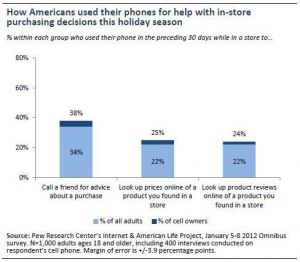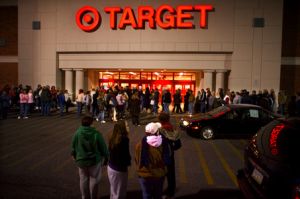|

While smartphone technology has enabled more consumers will the tools to become educated shoppers, physical retailers are left wondering how to compete with online retailers. According to the latest study out of the Pew Research Center’s Internet & American Life Project, over half of all shoppers during the 2011 holiday season used a cell phone to research a product that they were considering. Within the sample of 1,000 American adults, one fourth of the respondents whipped out their mobile phone within the store to look up the price of a product at other online retailers. Twenty-four percent of the group used a mobile phone to check out professional reviews of a product and 38 percent called a friend while in the store seeking advice on the quality of a particular brand or product.  Specifically regarding online product reviews, the study found that people that attended college were more likely to research a product through reviews and non-Caucasian people were more likely to research reviews than Caucasians. In addition, people between the ages of 18 to 49 were the most likely to research a product through online reviews while only four percent of people above the age of 65 used online reviews to factor into the purchase decision. Mobile users that lived in urban or suburban areas were also twice as likely to research a product through online reviews compared to rural residents. Specifically regarding online product reviews, the study found that people that attended college were more likely to research a product through reviews and non-Caucasian people were more likely to research reviews than Caucasians. In addition, people between the ages of 18 to 49 were the most likely to research a product through online reviews while only four percent of people above the age of 65 used online reviews to factor into the purchase decision. Mobile users that lived in urban or suburban areas were also twice as likely to research a product through online reviews compared to rural residents.
The same groups were more likely to use a mobile phone for price-matching or seek bargains through other online retailers with the Internet browser or smartphone application. Twenty percent of the people that use price-matching have made a purchase through an online retailer more recently than a purchase in a physical, brick and mortar store location. Within the people that did use a mobile phone for price matching, approximately 37 percent decided against buying the product at the store, 19 percent bought the product through an online retailer and eight percent purchased the item at another store location. Only a third of the people conducting this type of research actually bought the product within the original store. While some shopping malls turned to mobile phone updates to lure in more holiday shoppers, a startup called Signature Labs just released an iPhone application that’s designed to turn the mobile phone into a virtual personal shopper. Utilized by a retail store, the app connects customers with retail sales associates by allowing messages between the two parties as well as a way to setup an appointment for a future visit. The sales associate can setup the application with the customer’s favorite brands as well as sizes or other preferences. When the customer enters the store, the application can also fire off a greeting about those brands and products. The app can also send notifications from the store when sales are coming up or when a new product has hit the store shelves. While Signature Labs is currently looking for more retailers to use the service, interested consumers can sign up for the service and create a profile using Facebook Connect. There’s only one store on the service at the moment, clothing retailer 7 for All Mankind.  Over the last year, Target has attempted to fight back against shoppers that use mobile phones for price matching and research by asking manufacturers to create Target-specific products. These products use stock-keeping units (SKUs) that are unique to Target and typically don’t pop up during research when a customer is investigating online. It also halts smartphone owners from simply scanning a barcode to comparison shop through applications like RedLaser and ShopSavvy. Over the last year, Target has attempted to fight back against shoppers that use mobile phones for price matching and research by asking manufacturers to create Target-specific products. These products use stock-keeping units (SKUs) that are unique to Target and typically don’t pop up during research when a customer is investigating online. It also halts smartphone owners from simply scanning a barcode to comparison shop through applications like RedLaser and ShopSavvy.
As mentioned in a recent Wall Street Journal article, Target and other big-box retailers have previously voiced frustration about customers using retailer locations to view a product in-person, otherwise known at “showrooming”, and returning home to purchase the product online through a less expensive retailer like Amazon. In a recent letter to vendors, Target executives are requesting more exclusive products as well as more competitive prices. In addition, Target dropped hints about a subscription service for regularly purchased merchandise likely identical to Amazon’s “Subscribe & Save” service. Online sales grew by 15 percent during the 2011 holiday shopping season while physical retailers only saw a four percent bump in growth. | 








